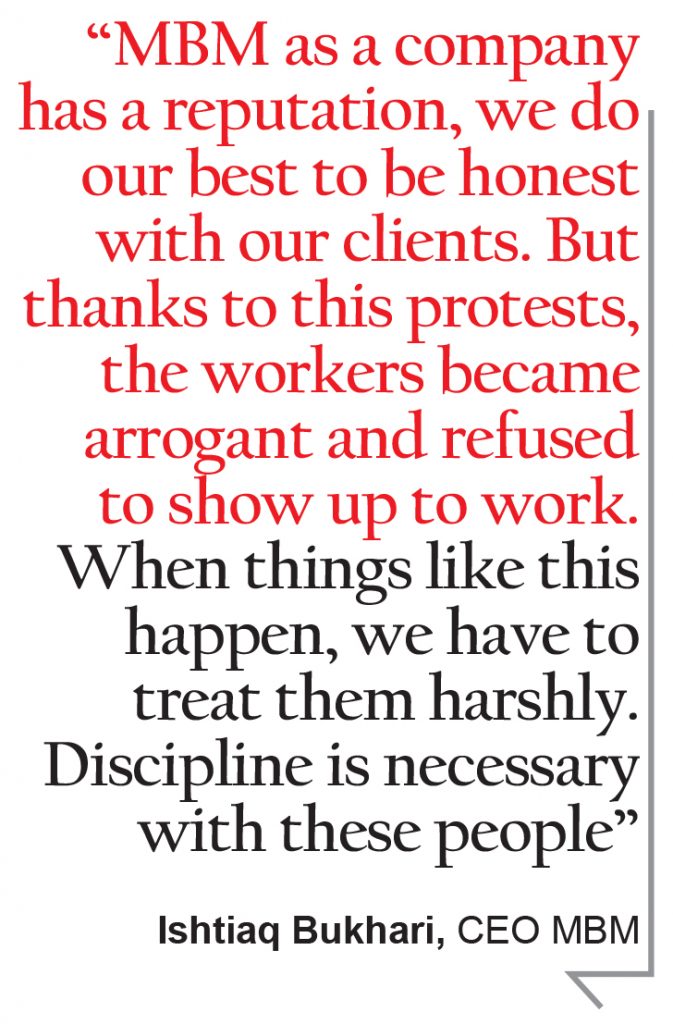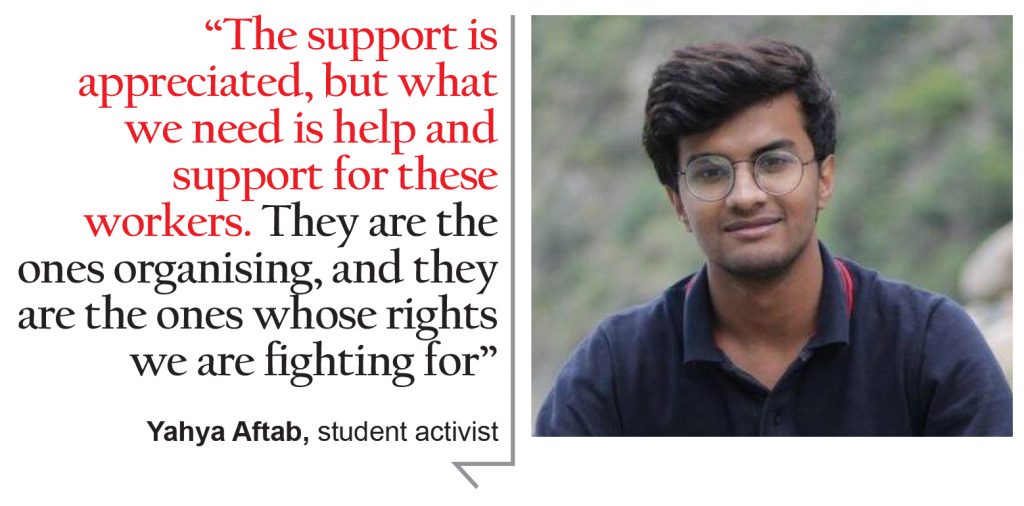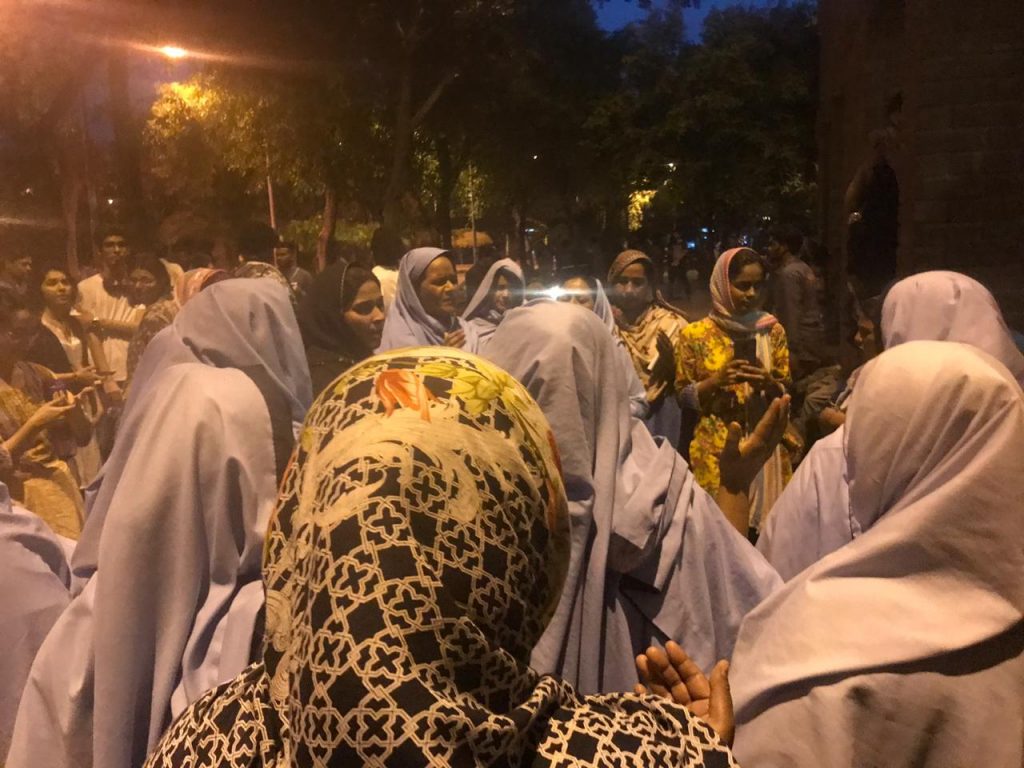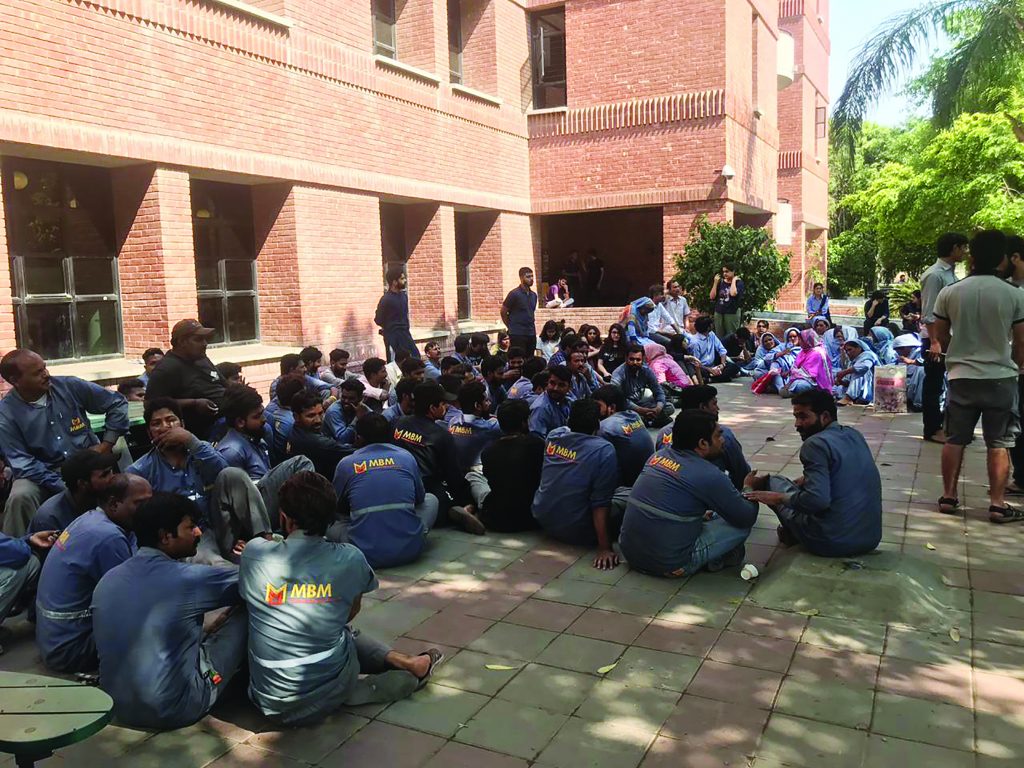On the 20th of April, the students, faculty and administration of the Lahore University of Management Sciences (LUMS) woke to strange scenes. Outside the university’s main dining hall, a large group of janitorial staff had gathered, sitting cross legged on the floor. They did not say anything, they had no banners and no plan – they simply sat there in silence, awaiting the attention they were so nervously trying to draw towards themselves. With the campus winding down from the regular semester and preparing to go into summer hibernation, one imagines it must have taken time before someone actually noticed there were enough of these workers gathered for it to mean something. The realisation that the janitorial staff of what is supposed to be an aggressively liberal university had collectivised and were staging a sit-in on campus in plain sight broke the lazy Saturday stupor of late April. Faculty from the law and humanities department were soon on the scene, and student activists rushed to take stock of the situation.
The demand of the protest was simple enough, the next day was Easter, and the majority Christian workers had been promised an advance on their salaries so they could celebrate their festivals. With no advances in sight, the haggard, oft-hounded staff gathered in their desperation. As students and faculty joined the protestors, notice was brought to the university management, who graciously arrived on the spot, only to inform the workers they could do nothing. Why? Because the protestors were not employees of LUMS, but had instead been subcontracted from a place called MBM – a human capital management solution company that has been providing janitorial staff to LUMS and other huge employers for years.
The protest raged, the students rallied, the workers waited – apprehensive but now fully embroiled in this stand-off. What happened next was at first heartening, and in its aftermath depressingly regressive.The stories that Profit heard from the MBM workers were often harrowing, the working conditions almost as appalling as the apathy of both MBM and LUMS.
In this feature, we will see the full sordid tale of how this protest boiled over and what it came to. But this is not the story of a single workers’ sit-in taking place at a famous university. This is a much larger story. One that tells the tale of a company called MBM. How it operates by joining hands with large corporations and institutes, and in the name of sub-contracting, releases them of their responsibilities towards their lower staff, all the while making money by skimping off these rights. It will be a lesson in mismanagement and the perils of unchecked middle management. It will relate the unfortunate reality of how these companies use the ignorance, helplessness and desperation of lower staff workers to blatantly disregard the decisions of the Supreme Court on the issue of subcontracting. Our character list includes an evasive CEO, an ageing leftist lawyer that thought he had put an end to subcontracting, a corrupt company supervisor making his fortune on the back of a Faustian deal, a hard nosed Colonel, a student activist, and most importantly, the workers. With the cast and setting in place, let’s start.
An unholy alliance
“Our society is primarily either feudal or capitalist, so that is the framework in which the law operates. It is also the system under which labour laws work” says Abid Hassan Minto. Sitting in his quaint office with pastel walls and warm lighting, he is a wizened old figure. The ageing lawyer has spent a lifetime fighting the good fight, taking up workers’ cases and putting in a prolific lifetime in the field of labour law. Old as he is, Minto is still not a figure to be trifled with. His movements may be slower, but his mind is as sharp as a tack – sitting in his office he animatedly lays out strategies for what his Awami Workers Party (AWP) should be doing to enter the mainstream of national politics. At an age where most men retire disillusioned, Minto still dreams of bringing a red revolution.
Even now, when he speaks to Profit on the issue of subcontracting, his deep voice finds the old strength of the lawyer still in him, as he explains to us the economic history of subcontracting. “Industry-relation laws in civilised societies codified the relationship between employer and employee, established what the rights of the employee are, especially their right to unionise. To save themselves from these new found expectations of the law, corporations and large employers began subcontracting – meaning they would not directly higher workers.”
The concept is simple enough. Instead of hiring your own workers, you pay a company to procure a certain amount of labour for you. The labour, although doing your bidding on your premises for your company, is employed by someone else. So when they unionise or bring their complaints to you, you can simply direct them back to their original employer. “Large scale employers wanted to avoid the new responsibilities that were coming in” explains Minto. “This gave birth to a group of people that made providing labour into a business. These contractors often beguile workers into this, and supply them to different commercial and industrial organizations that needed them without having to worry about the headache of their legal responsibilities towards them.”

Subcontracting, as Abid Hassan Minto explains, is an unholy alliance. One that frees organisations from their duties to workers in exchange for a fee that the contracting party pockets themselves. The primary case in Pakistan that made changes to the issue of labour law is the Fauji Fertilizer Case that Mr Minto fought in the Supreme Court. The decision of this case came out in 2013 and held that despite whatever contract they may have with the contractor, the organisation is responsible if the workers there are contributing to their industry, and if the organisation is exerting control over them.
What is MBM?
MBM is the archetypal company that Mr Minto described in his explanation of subcontracting. On their website, they define themselves as “a human capital management solution company.” The website also displays images of shining floors being rubbed clean by janitors in smart looking uniform with the letters ‘MBM’ emblazoned prominently on the back. It looks a clean, happy, efficient system with high tech cleaning buggies and foreign looking mops. Contact us and you don’t ever have to worry about janitorial services again, their website screams. On the list of companies that use their services, MBM boasts such names as CocaCola, JC Penny, Honda Atlas, Packages, the World Food Programme, Akhuwat, the US Consulate General Lahore, Metro Cash & Carry, Toyota and Nestle. While MBM also provides household services, their janitorial department is their crown jewel – and their list of clients is an impressive one. The company clearly means business.
For all their spread over the city and the big clients under its belt, MBM is nestled away in the middle of a domesticated Model Town street, deep in B block. Inside what looks like any other house, a handful of supervisors in crisp white shirts and tailored black pants walk around making calls and keeping things in order. The CEO of MBM, Ishtiaq Bukhari, is not a man that likes to be seen. On our first meeting, he is standing at the gate, when we ask him we are here to see Mr Bukhari, he directs us towards the reception. By the time the reception tells us Mr Bukhari was the unassuming man at the gate, he has slipped into one of the cars parked in the garage and sped away down the quiet Model Town streets. It takes messages, phone calls and getting blocked on whatsapp before Ishtiaq Bukhari finally agrees to speak to Profit on the phone, begrudgingly giving us answers when confronted about the company’s troubles at LUMS. To hear him speak of it, it was a simple issue of student miscreants – nothing his company could be held liable for.
“Cleanliness is half our faith, we are proud to be providing these services, and good workers are our strength. Why would we sabotage ourselves this way?” he asks. He has a point, but this is the only time he says something that seems slightly fond of the workers in passing. About his company, however, he is mum, only acquising to answering questions about the situation in LUMS, and that too only flat out denials and counter accusations.
“Some of these workers just don’t want to work” he says. “They cry so much that there are no jobs in this country, but when you give them jobs, they have a hundred complaints about it. This is not how the world works, and we owe our clients the best.”
From what Profit could glean from Bukhari’s words, he is a man serious about his business. But the extent to which MBM is willing to go in the pursuit of business is a worrisome one. For starters, their business model is interesting. At LUMS alone MBM has a dedicated staff of a 150 workers, 115 of whom belong to the same Christian community. The company refused to provide the exact number of their overall workforce, but it is definitely in the thousands. Again, while contracts differ from company to company and MBM has kept its cards close to its chest, their contract with LUMS stipulates that LUMS pays MBM Rs 23000 per worker, of which the worker gets a wage of Rs 15000. Some of the remaining Rs 8000 is meant for social security, EOBI benefits, health and benefits along with things such as maternity leave – all conditions that are included in the contract between MBM and whoever hires them. A small amount per worker is left behind as the company’s commission.

It sounds peachy, but what happens instead is the systematic implementation of certain mechanisms that ensure MBM makes the maximum profit that it can. LUMS was the prime example of this, where workers were overworked both by the university administration and MBM, not given their benefits, and had their guaranteed Rs 15000 arbitrarily cut without the slightest provocation. Despite making these cuts, MBM would get paid in full by the LUMS administration at the end of the month, pocketing all the cuts they made as profit. This, of course, also gave rise to a deadly empowered and corrupt middle management crop of supervisors. Of the few janitors Profit was able to contact at Packages before they were shooed away by death stares from their managers for interacting with customers at the mall, the same kind of stories emerged – arbitrary cuts and a hostile work environment where the contracting client and MBM joined hands to enforce vicious regimens on the workers and maximise their profits. For the organisations hiring MBM, the contracts they signed with them included such things as EOBI and health coverage, giving them sufficient legal cover, or so they claim. When contacted, Nestle said they would get back to Profit about their status with MBM but never ended up doing so, and the same was the case with Packages. Honda and other companies refused even to respond, either feigning ignorance or not responding at all. The only interesting exception was the American Consulate General in Lahore, which despite being listed on the MBM website as a client, said they subcontracted no services and all their janitors were directly employed – throwing further question upon the credibility of MBM as a company. At the same time, these companies turn a blind eye to the indiscretions of MBM and often actively participate and even encourage such behaviour – or at least this was part of the reason that LUMS became such a breaking point.
What’s all this about LUMS?
The story of MBM at LUMS is nothing short of a saga. At the university, MBM stationed one of its oldest hands, Shehbaz, now a notorious figure on campus who some claim still controls the happenings at LUMS with an iron fist, despite having been moved out from there. His ally in chief was one Colonel (r) Amer Khan Durrani, the head of the General Administration and Security at LUMS. Together, the two men exercised a reign of terror over the 150 staff of the MBM.

Shehbaz, as Ishtiaq Bukhari explained, was one of the workers. He was from the same Christian community that an overwhelming majority of them came from, and many of them were his kith and kin. To help him run the show, Shehbaz brought in his brothers and cousins as supervisors to consolidate his hold over the MBM staff at LUMS. As his time at LUMS grew, so did his powers. Egged on by MBM’s policy of cutting wages and messing with attendances, Shehbaz began dismissing workers over vague reasons such as ‘disrespecting him’ or ‘not maintaining discipline’. On the other end was the colonel, trying to impose the benevolence of his military training on unsuspecting workers, often publicly and loudly berating them. The situation was bad enough that the faculty and students ended up taking notice. Videos of professors appealing for better treatment of the workers made the rounds on social media, and the MBM workers fell into the unfortunate habit of having to cover the slashes in their already minimum wages by asking the student body to help them out monetarily in situations such as births and hospital visits – things that were supposed to be covered under the contract between MBM and LUMS.
As the situation worsened, so did Shehbaz’s corruption. Workers at LUMS still swear that tiles being used to rebuild the university’s dining hall were transported in the car of Colonel Amer’s number two and taken to a new house Shehbaz was constructing for himself – using money he skimmed off from MBM according to them. As the workers explained, Shehbaz would fire workers and continue drawing their salaries by asking random workers to go collect them from the MBM head office and would pocket them himself. His friendship with the university guards allowed him to fudge up the attendance records as he pleased, enabling him to knick extra cash, and rip off LUMS by having ghost workers. He would then make the already fearful remaining workers do overtime, for which MBM would not pay them. This was made all the easier since even though they are supposed to, MBM rarely provides employment contract or company identity cards to their workers, and actively discourage them to open bank accounts so they can deal directly in cash and continue their arbitrary cuts. But this dual scam with LUMS and MBM did not seem to phase either, because despite his indiscretions, Shehbaz was vital to keeping workers in line and continuing the unholy alliance between LUMS and MBM.
“We had a meeting with the MBM ownership. They said they knew that Shehbaz was taking money from them, but that they didn’t care because he was performing a vital function for them” explains Yahya Aftab, one of the most prominent student activists involved in the struggle of the MBM workers at LUMS.

While MBM might not have had much of an issue with Shehbaz and his ways, there was, however, enough uproar in LUMS for MBM to put Shehbaz on probation and conduct an independent inquiry. While he was still under this inquiry, the protest of April 20th took place. Students and workers came together, the Christian staff sang hymns as the protest dragged on into Easter Eve, and finally there was cheering and loud celebration when MBM finally released the Easter advances that the staff had been promised. But the celebrations would not last long. Right after Easter, there were lay-offs as the troublemakers, some of whom had been in LUMS for years, were transferred or asked to leave. According to Yahya, the day after the incident, 35 workers were sent away by the MBM supervisors themselves over vague charges so that they could then tell the LUMS admin that there was dissent among their ranks thanks to the protest, which had been egged on by the students. Ihstiaq Bukhari told a different story.
“MBM as a company has a reputation, we do our best to be honest with our clients. But thanks to this protests, the workers became arrogant and refused to show up to work. When things like this happen, we have to treat them harshly. Discipline is necessary with these people” he says. About the other accusations, he calls foul, saying that it is nothing but a slanderous social media campaign led by some over enthusiastic student activists.
“You know these activist types. I tried to talk to them with love and explain the situation, but they just don’t seem to understand how business works. There is a certain way to deal with the working classes, and the realities are often harsh.”
“We are fully and completely covered in every legal aspect, there is no question about it,” he said. Going on, he seemed even to tilt towards pinning the blame on LUMS. “You won’t see any such complaints from anywhere else, the problem is that these students and professors are riling up these workers and their egos are quickly inflated. When we try to discipline them, there is an uproar. We are trying to run a company here, and such problems from the client’s side are often bad for us.”

To his credit, Bukhari at least responded to our questions, even if it was after some serious evasion. LUMS, on the other hand, maintained at first a tactful ignorance that eventually turned into a deafening silence. Despite multiple emails and phone calls, nobody from LUMS could be found for comment. Colonel Amer Khan, the head of General Administration, who as per some accounts loves to play long rounds of tennis at the campus, did not seem to find enough time to respond to any of Profit’s multiple attempts to reach out for comment. The Vice Chancellor of the University, Dr Arshad Ahmed, also seemed uninterested, perhaps too busy playing tennis with the colonel, as he is often seen doing on campus when he isn’t taking leisurely strolls.
What does the law say?
“LUMS is a perfect example of how subcontracting is used as a device to exploit workers” says Usama Khawar, a labour lawyer with a close history to the subcontracting issue. Back when he was a law student at LUMS, he had been front and center in the then actions taken against LUMS’ former services provider, Brooms. Now, years later, the same issues have arisen with MBM.
“We are back to square one. This supposedly high and mighty liberal institutions is denying workers their rights. MBM is a simple device to help them avoid having to worry about issues such as workers asking for benefits” he says. As a lawyer, Khawar had trained under the legendary Abid Hassan Minto. Mr Minto, who had won the earlier mentioned Fauji Fertilizer case, expressed shock at the situation in LUMS.
“I didn’t think this was an issue anymore. The Supreme Court verdict had laid down exactly what was and what wasn’t the definition of an employer. This is the fundamental rule of industrial relations law, in our country and it has been reached after a long struggle and years of drudgery in the courts” said Mr Minto.
Long story short, under the precedent set by the Fauji Fertilizers case, companies getting their services from contractors are still responsible for the workers if they are doing work necessary to the industry, and the contracting organisation is exerting control over them. This is clearly the case for LUMS, in which case not only are they responsible for the well being of these workers, but also of ensuring that MBM is providing them with the contractual benefits settled between the two.
“There is no question about it,” says Usama Khawar. “Even if LUMS is not involved, it is illegal for them to hire a company like MBM when they know their practices and how they operate in what is not a strictly legal framework.
The lesson
“The situation has gotten worse,” Yahya Aftab confides to us. Since the protest, there have been stricter checks on the workers and more are being let go off. “Right now, the administration is threatening the workers by saying they will replace MBM with Brooms, their old contractor, which will mean that most of these workers will get the boot. Just the other day, six more people involved in the protest were laid off” he says.
For now, LUMS continues to do as it pleases with its janitorial workers. In other large organisations that employ MBM and other service providers, the dirty laundry of subcontracting is ever present. Despite the landmark Fauji Fertilizer company case, there seems to be no understanding that subcontracting has legally become a redundant practice. But for image conscious organisations, there needs to at least be a realisation that the costs are outweighing the benefits.

“We have gotten a lot of adulation and acclaim for this” Yahya says. “We were trending on twitter and there was media coverage and for a while we thought that we were getting something done. But other than saying nice things, there has been little help for us.”
“The support is appreciated, but what we need is help and support for these workers. They are the ones organising, and they are the ones whose rights we are fighting for.”
One hopes that a small fraction of this enthusiasm would rub off on some of these organisations.





Seems like LUMS is just the same run-of-the-mill organization exploiting workers. Shame.
Well, at least most of them don’t have to pay mandatory chanda tax as a certain cult does. To service the lavish lifestyle of maz qadiani.
Good topic to raise, but it is too lengthy. Difficult to continue reading after sometimes.
Comments are closed.